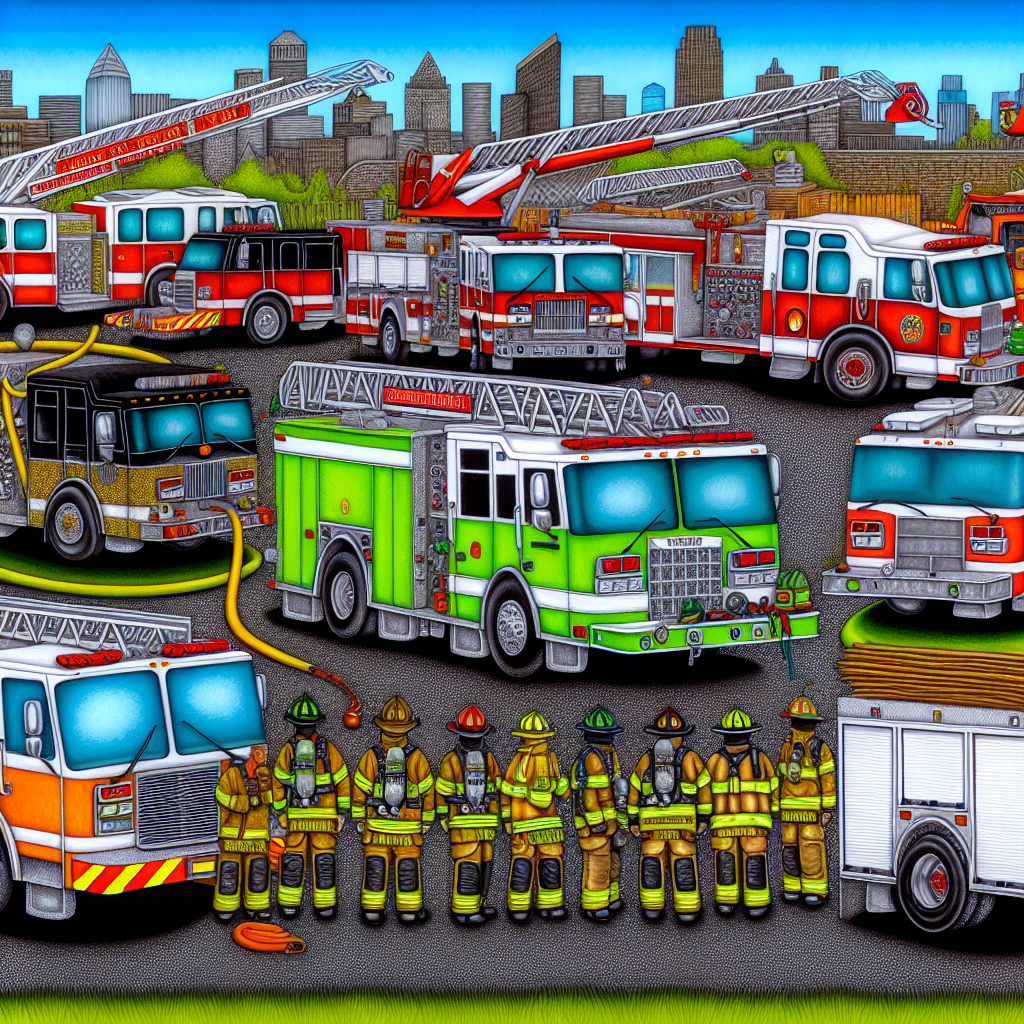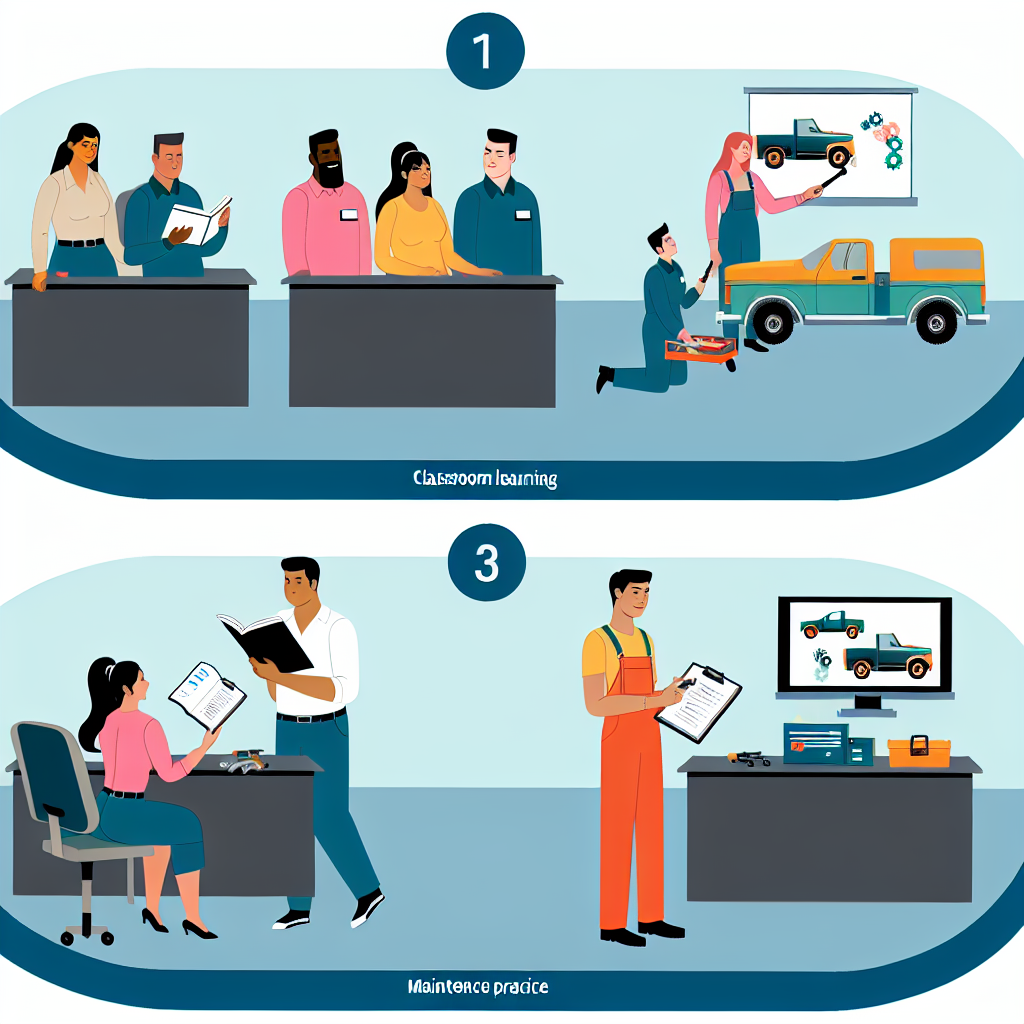In the realm of fire services, the longevity of fire trucks is paramount, making custom fire apparatus maintenance training for fleet technicians a critical investment. Proper training not only enhances the knowledge of technicians but also plays a vital role in extending the service life of these essential vehicles.
For instance, Pierce Manufacturing has been at the forefront of this initiative, providing specialized training since 1997, contributing to improved performance and reduced downtime for fire fleets. With 15 tailored classes currently available on various vehicles and systems, and a typical duration of 16 hours over two days, the focus on targeted education is designed to equip technicians with the necessary skills to perform effectively.
This strategic emphasis on training ensures that fire trucks remain reliable and operable, ultimately better serving communities when they are needed most. As we delve deeper, let’s explore the types of custom training programs offered to fleet technicians and how they can enhance operational efficiency.
Benefits of Customized Maintenance Training for Fire Trucks
Customized maintenance training offers several crucial advantages that significantly enhance fire truck performance and technician effectiveness:
-
Improved Repair Efficiency and Effectiveness: Training programs specifically structured for fire apparatus can lead to a 35% reduction in repair times. This also results in first-time fix rates hovering around 95%, while the occurrence of comeback repairs can drop by as much as 60%. These improvements translate into immediate returns on investment for fire departments through enhanced operational efficiency and minimized vehicle downtime, enabling fire trucks to respond promptly when needed. This statistic highlights the importance of skilled technicians in maintaining complex fire apparatus effectively.
(Source) -
Enhanced Preventive Maintenance: Comprehensive training fosters a culture prioritizing preventive maintenance, leading to a marked 15% increase in fleet availability. By shifting focus to preventive measures rather than reactive repairs, departments can minimize unplanned downtimes and extend the overall lifespan of the equipment. Such proactive strategies are vital in ensuring that fire trucks remain operable and dependable.
(Source) -
Increased Technician Retention and Professionalism: Departments investing in tailored training programs report up to an 85% technician retention rate. This investment in staff education not only enhances individual professionalism but also strengthens interpersonal trust within teams, leading to a positive safety culture. A well-trained team is more confident and effective, which directly benefits fire truck maintenance outcomes.
(Source) - Tailored Training for Unique Apparatus: Fire trucks are highly specialized and often customized vehicles. Providing specialized training ensures that technicians acquire the necessary knowledge and skills to effectively maintain and repair the specific features of this apparatus, enhancing overall fleet performance.
Overall, investing in customized maintenance training is not just an operational improvement; it is a strategic advantage for fire departments aiming for superior performance and reliability in their fleet operations.

Pierce Manufacturing’s Training Offerings
Pierce Manufacturing takes pride in offering comprehensive training programs designed specifically for fire apparatus technicians. These training classes are typically conducted in a 16-hour, two-day format, allowing participants to engage deeply with the content while balancing their busy schedules in the field. This hands-on learning approach ensures technicians gain practical experience alongside theoretical knowledge, optimizing their effectiveness in the maintenance and repair of fire apparatus.
Specific Classes Offered
-
Chassis Electrical:
This class delves into the intricacies of non-multiplex electrical systems on Pierce chassis. Technicians learn the location, function, and troubleshooting techniques for essential electrical components, empowering them to resolve issues swiftly and effectively.
-
Command Zone™ Systems:
This course focuses on the Command Zone™ electrical systems, emphasizing the latest Command Zone III technology. Participants receive training on system operation, diagnostics, and maintenance procedures critical to ensuring optimal performance of these advanced control systems.
-
Preventive Maintenance:
Covering essential maintenance procedures required by National Fire Protection Association (NFPA) and Department of Transportation (DOT) standards, this class equips technicians with the expertise to implement a robust preventative maintenance program. Through this training, technicians can significantly enhance the longevity and reliability of fire apparatus.
In addition to these courses, Pierce Manufacturing also offers various other classes, including TAK-4® Suspension Maintenance and CAFF/Husky Maintenance. Each training session culminates in an online certification, validating the skills and knowledge acquired, which is essential for maintaining high safety and operational standards in fire services. For more details on additional classes or to register, interested technicians can visit the Pierce Manufacturing website or contact their training department directly.
| Category | Standard Training Programs | Customized Training Programs |
|---|---|---|
| Cost | Generally lower upfront costs | Higher initial investment but potential for ROI |
| Duration | Fixed duration, typically shorter | Flexible scheduling, often longer to cover all details |
| Content Focus | General maintenance protocols | Specific to vehicle types and operational needs |
| Technician Engagement | Limited interaction, often lecture-based | High engagement with hands-on training and workshops |
Outbound Links to Authoritative Sources
For a deeper understanding of the benefits of maintenance training for fire departments and how it impacts fire truck efficiency, consider exploring the following authoritative resources:
-
Benefits of Maintenance Training
- Enhanced Equipment Reliability and Safety: Information on Training and Regulations
- Improved Operational Efficiency: USFA Report on Maintenance Strategies
- Skill Proficiency and Performance Enhancement: Ongoing Training Benefits
- Compliance with Standards and Regulations: Washington Admin Code
- Community Trust and Engagement: Developing Training Curriculums
-
Impact on Fire Truck Efficiency
- Importance of Maintenance Re-Certification: DPSST Guidelines
- Local-Level Training Options: Pennsylvania Fire Commissioner Resources
- Wildland Fire Safety Training: NWCG Annual Refresher
- Fire Apparatus and Equipment Maintenance Course: Sierra College Overview
- Educational Resources for Fire Safety: USFA Public Educator Resources
These resources provide valuable insights into the importance and impact of maintenance training in fire departments, enhancing operations and community safety.
The Importance of Preventive Maintenance
Preventive maintenance is essential for ensuring that fire apparatus lasts longer and performs optimally. This proactive approach involves regularly inspecting, maintaining, and repairing equipment to prevent potential failures. In the high-stakes environment of fire services, every moment counts. A solid preventive maintenance strategy can truly make a difference.
As one quote puts it, “Preventive maintenance can improve the longevity and lifespan of an apparatus and optimizes truck performance.” This highlights why preventive measures are so crucial. They help maximize the time between breakdowns, extending the service life of fire trucks. Fire departments depend on these vehicles during emergencies, making the need for routine maintenance urgent.
When firefighters and local dealers are trained to conduct daily inspections and effectively diagnose issues, the result is more reliable fire trucks. One quote sums this up well: “Fire trucks can stay in service for longer periods of time when firefighters and local dealers are armed with the knowledge to perform daily apparatus inspections and diagnose required repairs.” This shared knowledge significantly improves response efficiency during critical moments, ultimately enhancing community safety.
Moreover, regular maintenance activities like replacing worn-out parts, checking fluids, and running system diagnostics are vital. These tasks ensure that fire apparatus is always in peak condition. Well-maintained equipment performs better under pressure, conserving resources and minimizing environmental impact.
Training programs, such as those offered by Pierce Manufacturing, emphasize the importance of preventive maintenance. These programs focus on creating a strong preventive maintenance routine. Technicians learn to identify potential issues before they escalate into costly repairs. This results in an efficient firefighting fleet that operates reliably, protecting lives and property.
In summary, adopting preventive maintenance is not just beneficial; it is crucial for fire departments. Investing time and resources in this practice ensures that fire apparatus remains reliable, ready, and effective in serving the community.
Impact of Maintenance Training on Fire Truck Lifespan and Reliability
Recent statistics reveal significant insights into the lifespan of fire trucks and how maintenance practices influence their longevity. According to National Fire Protection Association guidelines, frontline fire engines typically have a recommended service life of 15 years, with reserve units not to exceed 25 years. Aerial apparatus often fall within a similar range, depending heavily on usage conditions. In practical terms, fire trucks in higher-demand urban settings may require replacement after 10 to 15 years, whereas those in rural departments can last up to 25 years. The longevity of these vehicles, however, is intricately tied to the quality of maintenance performed.
Departments adhering to stringent preventive maintenance schedules can extend the operational lifespan of their fire apparatus significantly. For example, the Loveland Fire Rescue Authority’s strategy of active use followed by considerate transition to reserve status showcases how economically prudent management can push a truck’s service life to nearly two decades. Contrastingly, insufficient maintenance practices can lead to disastrous outcomes, as highlighted by incidents in Seattle where lapses resulted in operational failures and heightened repair costs.
These challenges underscore the importance of proper maintenance training. Enhanced technician training equips personnel with the necessary skills to execute thorough inspections and repairs, thereby reducing downtime and augmenting the reliability of fire trucks in emergencies. When departments invest in ongoing training, they not only optimize the performance of their fleet but also promote a culture of accountability and safety within their teams. This proactive approach to maintenance and training is essential for ensuring that fire apparatus remain reliable, ready, and capable of responding effectively to the communities they serve.
Case Study: Celina Fire Department
In an endeavor to enhance their training protocols, the Celina Fire Department in Texas partnered with Fire Engineering Training to implement a more structured maintenance training program for their personnel. This transition not only standardized their training approach but also significantly increased engagement among technicians, resulting in a 30% improvement in training participation. Division Chief Justin Beamis remarked that the new program provided a more personal, detailed, and structured training experience, moving away from conventional training methodologies that often fell short in engagement. This transformation equated to better-prepared technicians, contributing to enhanced fire truck maintenance and operational efficiency.
Montgomery County Fire and Rescue Services
Chief Tom Carr of Montgomery County, Maryland, recognized the critical need for improvement after several incidents that jeopardized firefighter safety. He initiated a comprehensive review of departmental leadership and training practices, which subsequently led to a more robust maintenance training regimen. By focusing on tailored training aimed at addressing specific departmental vulnerabilities, they observed measurable enhancements in operational performance and decision-making during emergency scenarios. This proactive approach not only decreased risk but also optimized response times, benefiting the community as a whole.
Data-Driven Innovations at Atlanta Fire Rescue Department
The Atlanta Fire Rescue Department took an innovative approach by collaborating with researchers to utilize data-driven methodologies for their maintenance and inspection routines. Through the introduction of the “Firebird” framework, they could predict potential fire incidents efficiently, applying targeted maintenance training that significantly enhanced their inspection prioritization. This resulted in a 71% true positive rate on predicting fires, reflecting the profound impact that targeted training in maintenance practices can have on operational efficiency.
Victoria Fire Department’s Predictive Maintenance Strategy
Similarly, the Victoria Fire Department in Minnesota leveraged machine learning models to optimize their fire station locations based on predicted service demands. By implementing maintenance training tailored to their newly established data-driven strategies, they achieved an impressive 80% true positive rate in service demand predictions. This innovative solution not only ensured better resource allocation but also improved emergency response attributes, showcasing how custom training can lead to operational excellence.
These case studies collectively illustrate that when fire departments invest in tailored training initiatives, they not only improve technician competency but also enhance overall service delivery. The measurable outcomes from these programs underscore the critical role of maintenance training in maintaining operational readiness in the fast-paced world of fire services.
Conclusion
In conclusion, investing in custom fire apparatus maintenance training for fleet technicians is paramount for extending the lifespan and improving the performance of fire trucks. Throughout this article, we have seen how tailored training programs lead to significant improvements, including a reduction in repair times, increased efficiency of preventive maintenance practices, and heightened technician retention rates. These factors not only enhance the operational capabilities of fire departments but also ultimately contribute to community safety by ensuring that fire trucks are always reliable and ready to respond when called upon.
Moreover, as fire apparatus becomes increasingly sophisticated, the need for specialized training tailored to the unique characteristics of each vehicle grows. By empowering technicians with the knowledge and skills required to maintain and repair these vital vehicles, fire departments can foster a culture of accountability and excellence.
Thus, we encourage fire departments to consider investing in customized training for their fleet technicians, enabling them to maximize the potential of their apparatus and ensure they are always equipped to protect and serve their communities effectively.
Conclusion
In conclusion, investing in custom fire apparatus maintenance training for fleet technicians is paramount for extending the lifespan and improving the performance of fire trucks. Throughout this article, we have seen how tailored training programs lead to significant improvements, including a reduction in repair times, increased efficiency of preventive maintenance practices, and heightened technician retention rates. These factors not only enhance the operational capabilities of fire departments but also ultimately contribute to community safety by ensuring that fire trucks are always reliable and ready to respond when called upon.
Moreover, as fire apparatus becomes increasingly sophisticated, the need for specialized training tailored to the unique characteristics of each vehicle grows. By empowering technicians with the knowledge and skills required to maintain and repair these vital vehicles, fire departments can foster a culture of accountability and excellence.
Thus, we encourage fire departments to consider investing in customized training for their fleet technicians, enabling them to maximize the potential of their apparatus and ensure they are always equipped to protect and serve their communities effectively.
As we reflect on the significance of training, let us remember the words of Winston Churchill: “Success is not final, failure is not fatal: It is the courage to continue that counts.” This quote encapsulates the importance of continuous learning and improvement in fire service training.

Exploring the Impact of Training on Fire Apparatus Performance
This section delves into how different training methodologies can significantly influence the operational efficiency of fire apparatus. By examining various case studies and testimonials, we will uncover the tangible benefits of specialized training.
Best Practices in Fire Truck Maintenance Training
Here, we will outline essential best practices that fire departments should adopt to optimize their maintenance training approaches. These practices will serve as a guide for ensuring that technicians are well-prepared to handle the demands of modern fire apparatus.
Future Outlook on Fire Truck Maintenance Training
In this concluding section, we will discuss emerging trends in fire truck maintenance training, including advancements in technology and changes in training delivery methods. This insight will prepare departments for the evolving landscape of firefighting and apparatus maintenance.
Summary of Key Takeaways
This concise section will recap the main insights shared throughout the article, emphasizing the importance of ongoing training for fire apparatus technicians and the impact on overall fire department performance and community safety.
Exploring the Impact of Training on Fire Apparatus Performance
This section delves into how different training methodologies, particularly fire truck maintenance training, can significantly influence the operational efficiency of fire apparatus. By examining various case studies and testimonials, we will uncover the tangible benefits of specialized training.
Best Practices in Fire Truck Maintenance Training
Here, we will outline essential best practices that fire departments should adopt to optimize their maintenance training approaches. Key topics include enhancing technician efficiency and implementing effective preventive maintenance strategies to ensure technicians are well-prepared to handle the demands of modern fire apparatus.
Future Outlook on Fire Truck Maintenance Training
In this concluding section, we will discuss emerging trends in fire truck maintenance training, including advancements in technology and changes in training delivery methods. This insight will prepare departments for the evolving landscape of firefighting and apparatus maintenance.
Summary of Key Takeaways
This concise section will recap the main insights shared throughout the article, emphasizing the importance of ongoing training for fire apparatus technicians and the impact on overall fire department performance and community safety.


